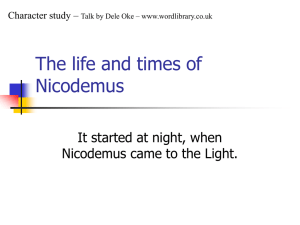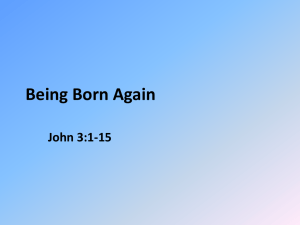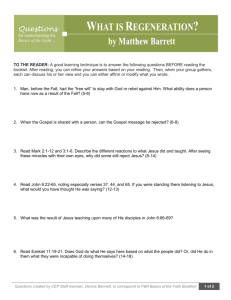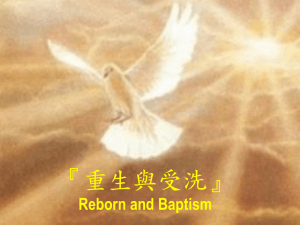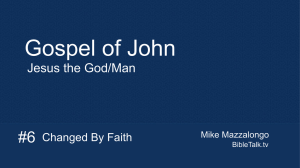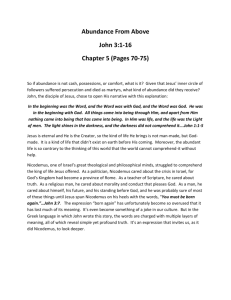Word doc - First Congregational United Church of Christ
advertisement
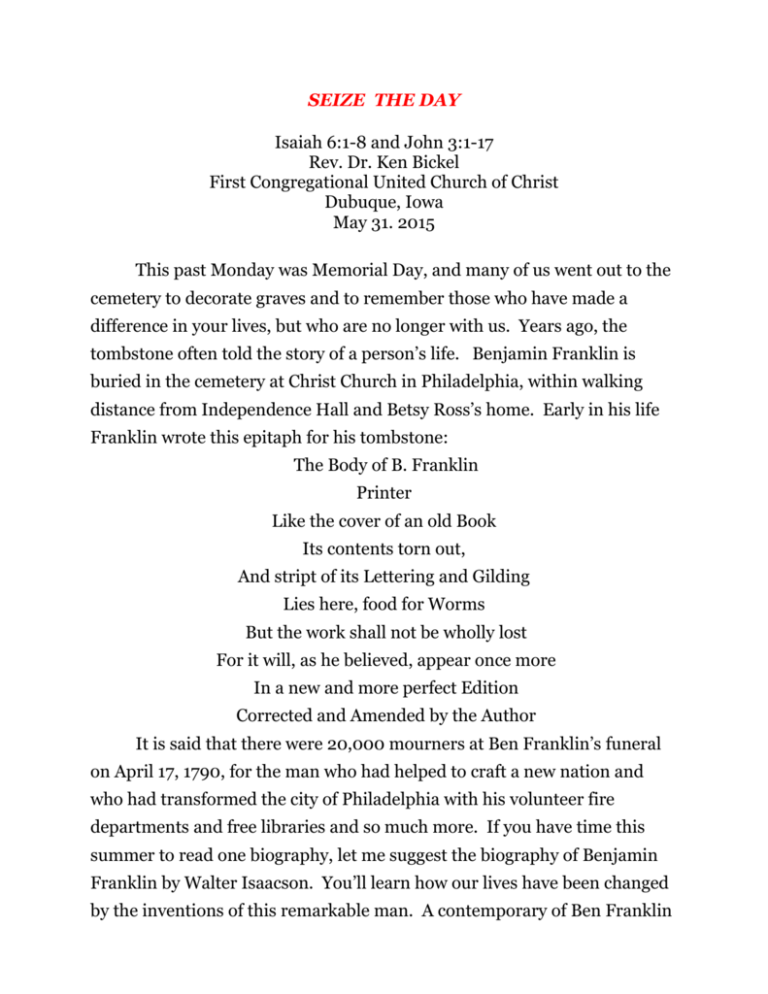
SEIZE THE DAY Isaiah 6:1-8 and John 3:1-17 Rev. Dr. Ken Bickel First Congregational United Church of Christ Dubuque, Iowa May 31. 2015 This past Monday was Memorial Day, and many of us went out to the cemetery to decorate graves and to remember those who have made a difference in your lives, but who are no longer with us. Years ago, the tombstone often told the story of a person’s life. Benjamin Franklin is buried in the cemetery at Christ Church in Philadelphia, within walking distance from Independence Hall and Betsy Ross’s home. Early in his life Franklin wrote this epitaph for his tombstone: The Body of B. Franklin Printer Like the cover of an old Book Its contents torn out, And stript of its Lettering and Gilding Lies here, food for Worms But the work shall not be wholly lost For it will, as he believed, appear once more In a new and more perfect Edition Corrected and Amended by the Author It is said that there were 20,000 mourners at Ben Franklin’s funeral on April 17, 1790, for the man who had helped to craft a new nation and who had transformed the city of Philadelphia with his volunteer fire departments and free libraries and so much more. If you have time this summer to read one biography, let me suggest the biography of Benjamin Franklin by Walter Isaacson. You’ll learn how our lives have been changed by the inventions of this remarkable man. A contemporary of Ben Franklin was an Englishman by the name of John Newton. John Newton’s tombstone reads like this: John Newton Clerk Once An Infidel, and Libertine A Servant of Slaves in Africa Was By the Rich Mercy of Our Lord and Savior Jesus Christ Preserved, Restored, Pardoned And Appointed to Preach the Faith He Had Long Labored to Destroy John Newton had a loving mother who taught John hymns and had him memorize Bible passages. However, she died when John Newton was seven and his father, who was a sea captain, sent him off to boarding school. He left boarding school at ten and headed to the high seas with his father. He was eventually pressed into service by the British navy, from which he deserted, was captured and then flogged. He ended up working on slave ships and was amazed that they could stuff six hundred captured Africans packed like sardines into the ships lower deck and haul them to the new world to be sold as slaves. Eventually, he became the captain of a slave ship. On one trip to London, he was hitting the bars and prowling the streets when he passed a little Methodist mission where he heard people singing about their faith. It reminded him of his mother’s teaching him Christian hymns and John Newton felt compelled in his heart to go in. Inside the chapel people were singing about the grace of God and the preacher was talking about God’s love for everyone. That evening, John Newton made a U-turn; he was totally transformed. It was like he started his adult life all over again. Eventually he would become a Christian minister, and he served with an evangelical spirit in the Church of England for 43 years until his death at the age of 82 in 1807. Across the years John Newton wrote 281 hymns. The one you know best was originally titled “Faith’s Review and Expectation,” but soon became known as “Amazing Grace.” John Newton was talking about his own life when he wrote, “Amazing grace, how sweet the sound! That saved a wretch like me! I once was lost, but now am found; was blind, but now I see.” We will sing this beloved hymn as our closing hymn today. John Newton seized the day. He looked at his life, and he looked at the teachings of Jesus, and he knew that he had to go a new direction, so he started all over again. In our Gospel Lesson for today we heard about the familiar Pharisee named Nicodemus. Nicodemus comes to Jesus under the cloak of darkness to try to understand his message and to try to find out how he could let Jesus into a little corner of his life without making any major changes. Jesus tells Nicodemus it won’t work, for Nicodemus needs a total, radical change. He must start all over again; he must be born anew. There can be no minor repairs of his religious life. Nicodemus must seize the day; he must allow this encounter with Jesus to be a life-altering experience and start all over again. Can you teach an old dog new tricks? Can an older man embrace the radical teachings of this man of Nazareth? Jesus knows it is possible, but Nicodemus in not sure. “How can anyone be born after having grown old?” Jesus answered him, “Very truly, I tell you, no one can enter the kingdom of God without being born of the water and Spirit.” Through the water of baptism and the power of the Holy Spirit, change can come to Nicodemus and to people here today in worship. Seize the day! There is a power at work in Jesus that can change Nicodemus, that can change John Newton, and that can change you and me. It is a power that comes from God. It is a power based on God’s love. What did we read in John 3:16-17? “For God so loved the world that he gave his only Son, so that everyone who believes in him may have eternal life. Indeed, God did not send the Son into the world to condemn the world, but in order that the world might be saved through him.” A new life happens through the love of God and God’s Son, our Savior Jesus Christ. Nicodemus was a religious person called a Pharisee; he was conscious all the time of being morally upright, of keeping every nuance of every Torah law. He was a respectable person, but he knew that by living by the law he had not experienced the joy and love that he saw in the eyes of Jesus. Jesus challenged him to start all over again, to change his way of looking at the world and at his faith. Sometimes, as I read this passage I want to shout to Nicodemus, “Do it! Seize the day! Just do it! Let Jesus into your heart and let Jesus be the Lord of your life!” Back in 1989, Robin Williams starred as John Keating in the movie titled “Dead Poet’s Society.” The movie was set in 1959 at a private boarding school called Welton Academy. Mr. Keating tried to help the students break out of conventional ways of thinking. Today we would say he urged them to think outside the box. In one early scene, Robin Williams has the class out in the foyer examining the pictures of former students who have long since died. He firmly, yet sensitively, explains that just like these former students, they too will die some day. Because their time on this earth is not endless, he says to them quite intensely, “Carpe diem” which is Latin for “Seize the day.” Mr. Keating tells the boys to lean their ears very close to the pictures and listen to what the departed have to say to the students. As they lean toward the pictures, he quietly whispers, as if from the dead, Carpe diem, carpe diem. Nicodemus needed a Mr. Keating, he needed someone to whisper in his ear, “Seize the day!” In today’s Old Testament Lesson from Isaiah, we hear of a vision that Isaiah saw in 740 BC. Uzziah had been a good and powerful ruler of Israel from 792 to 740 BC when he died. His death precipitated a crisis as Assyria gained influence during this time of political transition. Israel was weakened. The leaders and people allowed themselves to be influenced by the Assyrian culture and religion, distancing them from worship of Yahweh, our God. In the midst of the spiritual darkness, Isaiah has a vision of God in glory where there is constant praise and worship of God. The prophet, in his role of representing the people, responds to the revelation of God’s glory with a personal confession and also speaks on behalf of the whole Israelite faith community when he says, “Woe is me! I am lost, for I am a man of unclean lips, and I live among people of unclean lips.” After his confession he receives God’s grace and compassion. When Isaiah responds to the question “Whom shall I send, and who will go for us?” Isaiah says, “Here I am, send me.” Isaiah is accepting God’s invitation to a new life and a new way of living. He is willing to seize the day! What makes the story of Isaiah and the story of Nicodemus so appropriate for us to hear on Trinity Sunday is the fullness of a portrayal of who God is and how God interacts with us. God is holy and transcendent, the one to whom we are to offer unceasing praise and worship. God is also immanent and personal, touching our individual lives and giving us new purpose and meaning in our daily living. God is with us through the Holy Spirit during each step we take as we journey through life. We need God for the journey, a God we know as Father, Son and Holy Spirit; a God we know as Creator, Savior, and Sustainer; a God we know as Maker, Friend, and Presence. Every day we live on this earth we have opportunities to broaden and deepen our experience of God’s love and grace. We, like Isaiah, can offer ourselves to be the one to go and tell others about this incredible God that deserves our total loyalty. We, like Nicodemus, have the chance to seize the day and make the way of Jesus Christ into the way we journey each day. Don’t sit back and dither and ponder whether to serve a God fully known to us in the Trinity, make the decision today and live the life of the Christian faith today, tomorrow and forever. Amen.
